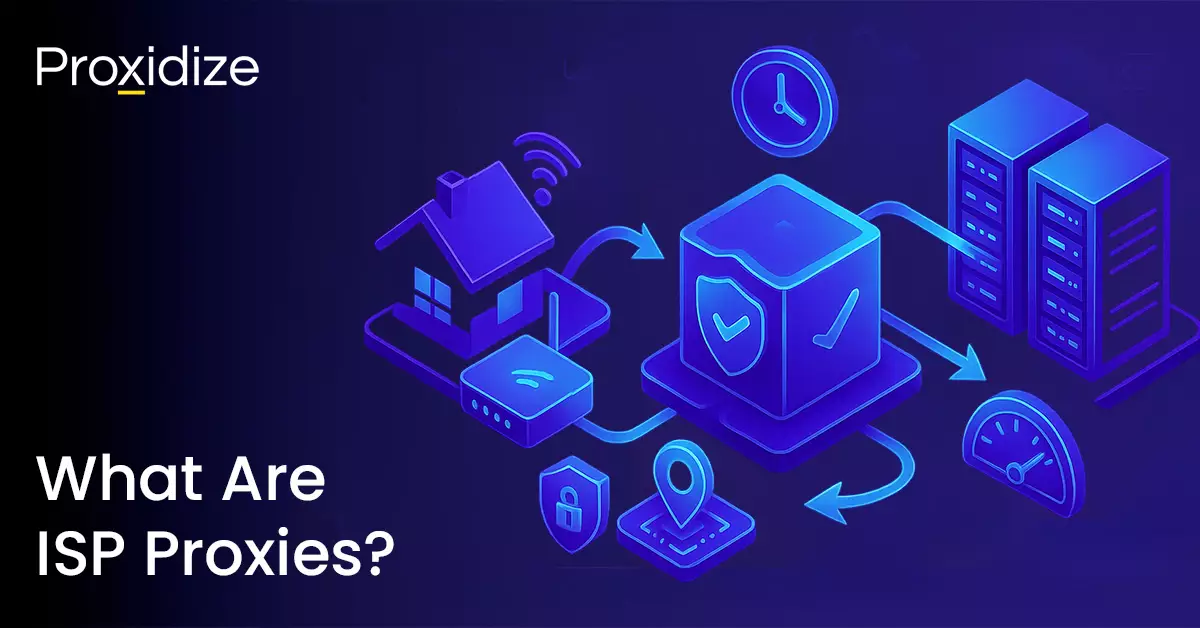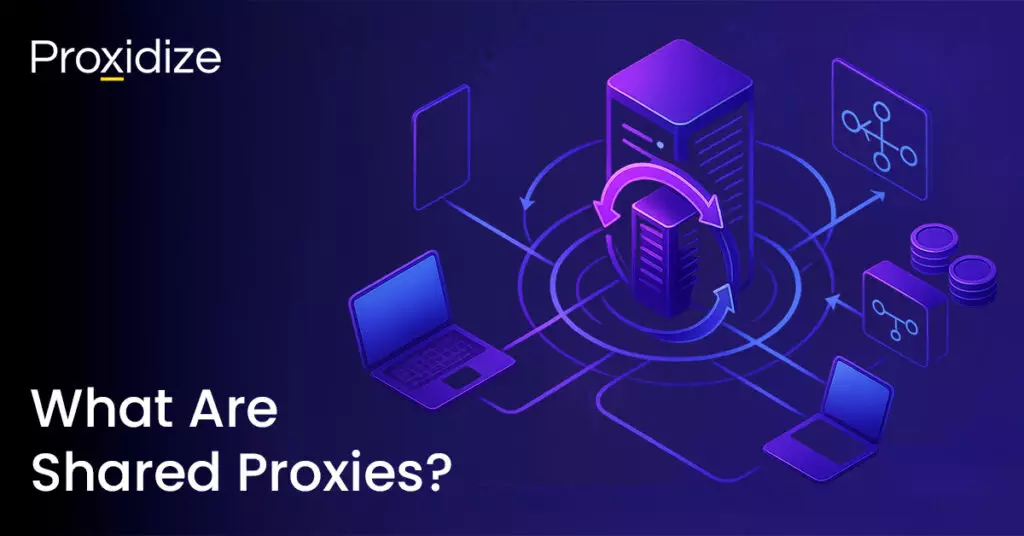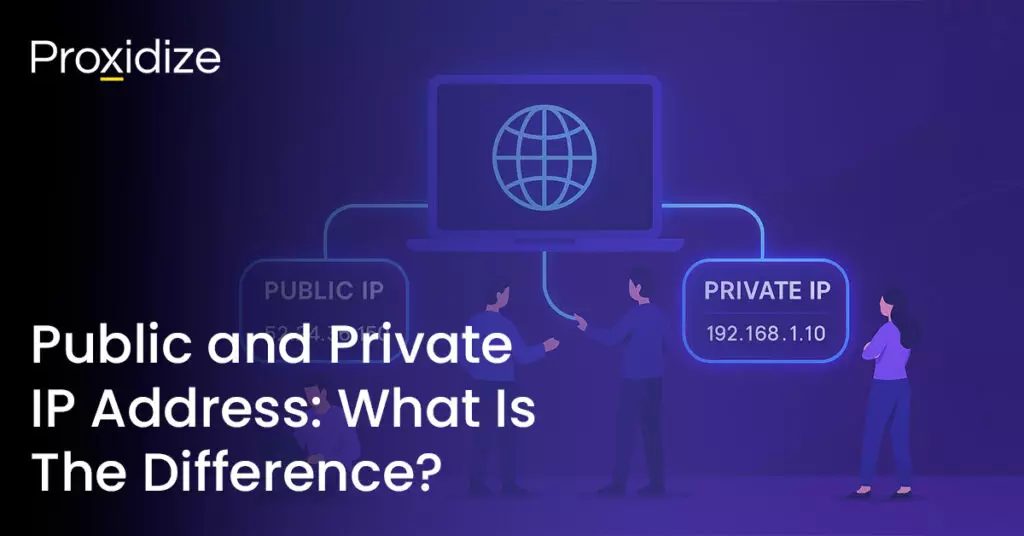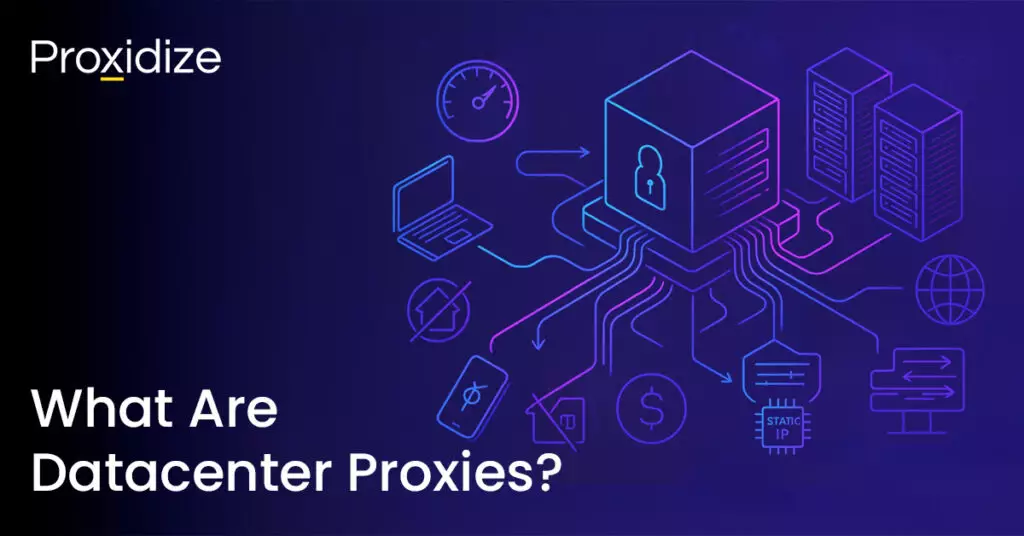ISP proxies sit somewhere in the middle between the familiar categories of datacenter proxies and residential proxies. They use authentic-looking IP addresses sourced from real internet service providers (ISPs) but run from a controlled infrastructure that’s more like a data center. The result? You get something that looks like a regular home connection to outside websites, but with the added bonus of a stable connection and fewer downtime hiccups. These proxies, sometimes called static residential proxies — because at their core that’s what they are — blend the best of both worlds: You look like a residential user and get the dependability you’d expect from a professional hosting environment.
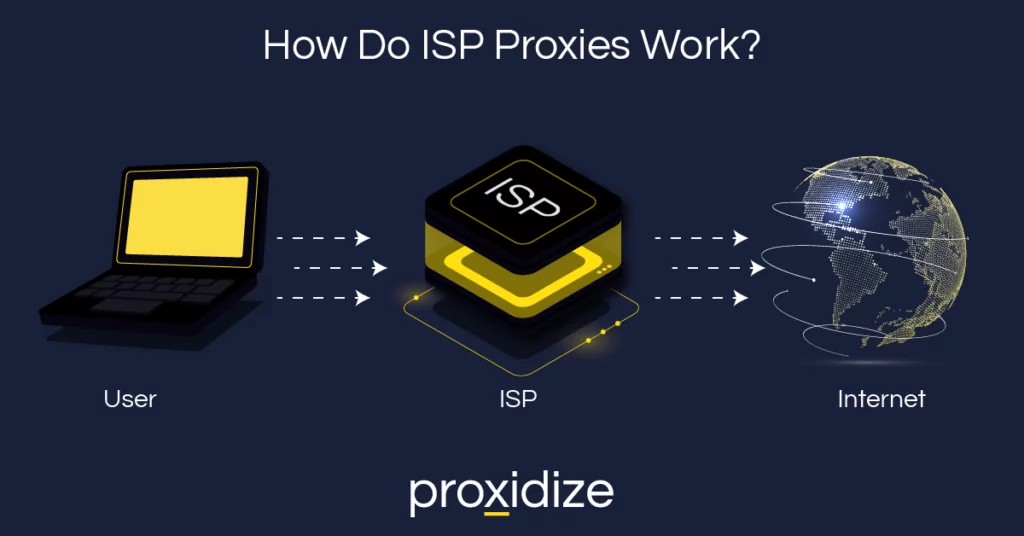
How Do ISP Proxies Work?
On the surface, ISP proxies act just like any other type of proxy server — you send a request that gets routed through the proxy before hitting your destination website. The difference is where their IP addresses come from: they pull them directly from ISPs, not from big server farms or home connections. These IPs are often static, which is why they’re sometimes called static residential proxies, meaning they don’t rotate as much as other residential IP addresses.
What makes ISP proxies different? To illustrate why ISP proxies stand out, it helps to put them side-by-side with their more traditional counterparts.
Datacenter Proxies vs. ISP Proxies
Datacenter IPs are usually sourced from big server farms and hosting providers. They’re fast, budget-friendly, and great for bulk tasks. But since they don’t resemble a normal household internet line, some websites can detect and block them pretty easily. On the other hand, these types of proxy rely on a managed IP pool that ensures unlimited bandwidth and stable sessions.
ISP proxies, by contrast, draw from IPs handed out by real ISPs. This makes them look like average household devices. They’re still run in a managed, stable environment, so you get fewer performance surprises. Plus, because they appear so genuine, even sophisticated websites that flag non-residential IPs are less likely to shut you down.
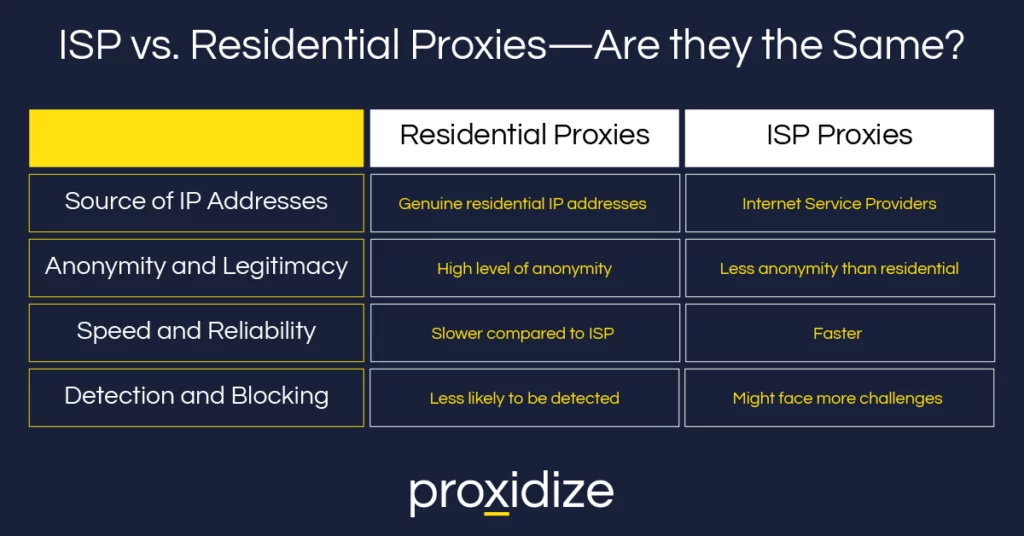
Residential Proxies vs. ISP Proxies
Residential proxies are considered authentic; they source their IPs from a home that has a contract with an ISP. As a result, their IP matches a website’s expectation of a real user surfing the internet. Compared to a datacenter proxy, however, their connection is less guaranteed — connection speed and quality can vary greatly between homes let alone between countries.
ISP proxies, by virtue of sourcing their IPs from an ISP, maintain a similar level of authenticity as a residential proxy with the added benefit of being hosted in a commercial environment where uptime and high performance are mandatory. The benefit is that an ISP proxy’s IPs aren’t flagged as commercial, something that usually results in datacenter proxies being blocked.
Pros and Cons of ISP Proxies
Advantages of ISP Proxies
- Increased Authenticity: Because these IPs look like normal household connections, websites are less suspicious. That often means fewer annoying blocks, captchas, or forced verifications.
- Improved Uptime: ISP proxies run on enterprise-grade infrastructure, which means fewer hiccups, less downtime and greater built-in redundancies. This translates to fewer sudden disconnections and smoother scraping sessions.
- Balance of Performance & Trust: They’re typically faster than pure residential proxies and not as easily flagged as datacenter proxies. In other words, if you need to do large-scale crawling, scraping, or activities that benefit from a static IP, ISP proxies can handle the load without constantly getting shut down.
Disadvantages of ISP Proxies
- Increased Cost: The trade-off for this improved performance and trust is a higher price point. You’re paying for that extra authenticity and stability compared to datacenter proxies.
- Fewer IPs: Proxy providers have invested a lot to cultivate large residential proxy pools with hundreds of thousands of IPs. By contrast, ISP proxy pools can be smaller. On top of that their IPs are static. If you need to constantly rotate through massive numbers of unique addresses, an ISP proxy is not going to be for you.
In short, ISP proxies are — in terms of authenticity — a step up from datacenter proxies while maintaining their professional infrastructure, which comes at an increased cost and less IP diversity as they have to be specifically sourced from ISPs.
When to Use ISP Proxies
There are certain scenarios where ISP proxies really earn their keep:
- Stricter Antibot Environments: Some platforms will outright ban any datacenter IPs and ISP proxies help fly under the radar while maintaining a static IP. This helps simulate real user traffic while maintaining as much performance as possible.
- Long-Term Projects That Need Consistency: If you’re engaging in automated activities that require a static residential IP where uptime is crucial, ISP proxies can offer both. This is particularly relevant for social media activity, for example.
- Consistent Geoactivity: ISP proxies can make you appear like a real, local internet user with a consistent residential IP.
Conclusion
ISP proxies, which are functionally static residential proxies, are a compromise on the speed, uptime, and cost of datacenter proxies in favor of the authenticity of residential proxies without abandoning the professional infrastructure of datacenters. They help address the pain points data collectors, marketers, and automators face — like IP bans or increased CAPTCHAs — by offering a solution that’s both authentic-looking and consistently reliable.
Key Takeaways:
- ISP proxies blend the trustworthy look of residential IPs with the steady reliability of datacenter-level environments.
- They help cut down on annoying blocks, CAPTCHAs, and other roadblocks.
- More expensive than datacenter proxies but faster and more stable than residential proxies.
- A static residential IP is best used in presenting a persistent profile to websites.
- They don’t enjoy the same IP diversity as datacenter or residential proxies.
If you’re struggling with anti-bot systems and websites that view your datacenter IPs with suspicion but don’t have the budget to switch over to more authentic alternatives, ISP proxies can offer a middle ground in terms of cost without giving up the speed, redundancies, and uptime of datacenter infrastructure and worth considering.
Frequently Asked Questions
How do ISP proxies differ from other proxy types?
Unlike a datacenter proxy server, ISP proxies rely on addresses from Internet service providers, giving them a more authentic look compared to standard center proxies or purely residential bandwidth proxies. This blend helps simulate a regular user environment, maintaining a level of anonymity without sacrificing performance. In short, ISP proxies deliver a wide range of use cases with exceptional response times and faster speeds, all while remaining harder to detect than basic proxy server options.
What benefits do ISP proxies offer for online activities?
ISP proxies excel at handling online activities where authenticity, unlimited-duration sessions, and heavy traffic loads matter. From social media management and SEO monitoring to tackling geo-restricted content and intense search engine scraping, these proxies help ensure success rates on complex platforms. Their ability to present as a real device with a consistent identity makes them ideal for everything from e-commerce monitoring and ticket purchasing to bypassing anti-scraping measures on high-security sites.
Can ISP proxies improve SEO performance?
Yes. Because ISP proxies resemble genuine human users, search engines are less likely to flag your activity as automated. This can positively affect search engine results, enabling smooth SEO performance tracking, efficient browser affect search engine tasks, and more reliable search engine scraping. The result? More accurate insights, better success rates, and a greater ability to tailor your content or strategies based on genuine, region-specific content.
How stable and reliable are ISP proxies compared to other options?
ISP proxies are hosted on datacenter infrastructure with enterprise-grade hardware, yielding reliable sessions, unlimited traffic, and faster speeds. This ensures a smooth experience for both long-term projects and short, intense data extraction tasks. ISP proxies can offer exceptional response times, making them well-suited for financial managers, B2B companies, and publicly-traded companies that depend on accuracy and uptime.
